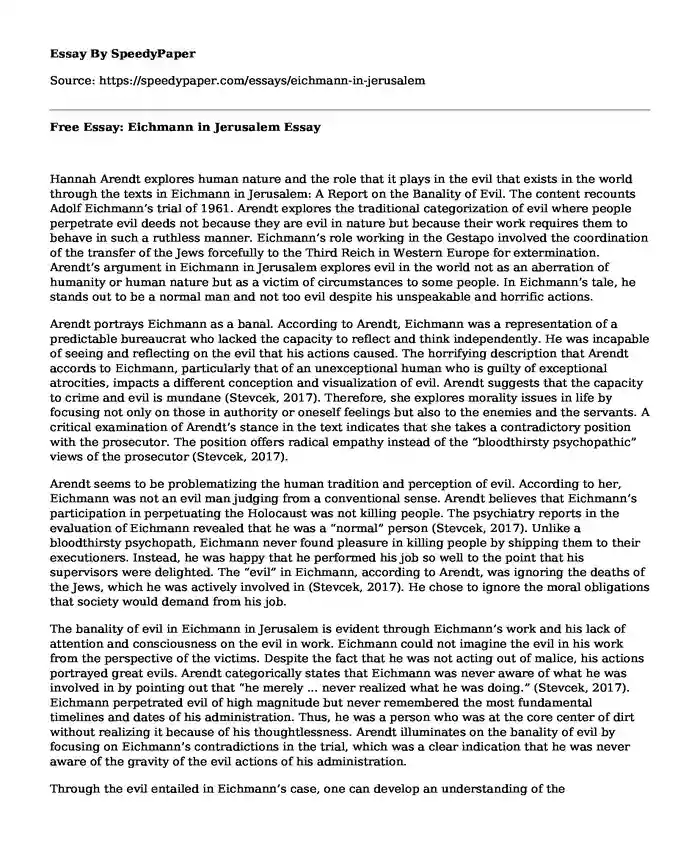
| Essay type: | Reflective essays |
| Categories: | World War 2 Court system Concentration camps Essays by wordcount Historical & political figures |
| Pages: | 3 |
| Wordcount: | 794 words |
Hannah Arendt explores human nature and the role that it plays in the evil that exists in the world through the texts in Eichmann in Jerusalem: A Report on the Banality of Evil. The content recounts Adolf Eichmann’s trial of 1961. Arendt explores the traditional categorization of evil where people perpetrate evil deeds not because they are evil in nature but because their work requires them to behave in such a ruthless manner. Eichmann’s role working in the Gestapo involved the coordination of the transfer of the Jews forcefully to the Third Reich in Western Europe for extermination. Arendt’s argument in Eichmann in Jerusalem explores evil in the world not as an aberration of humanity or human nature but as a victim of circumstances to some people. In Eichmann’s tale, he stands out to be a normal man and not too evil despite his unspeakable and horrific actions.
Arendt portrays Eichmann as a banal. According to Arendt, Eichmann was a representation of a predictable bureaucrat who lacked the capacity to reflect and think independently. He was incapable of seeing and reflecting on the evil that his actions caused. The horrifying description that Arendt accords to Eichmann, particularly that of an unexceptional human who is guilty of exceptional atrocities, impacts a different conception and visualization of evil. Arendt suggests that the capacity to crime and evil is mundane (Stevcek, 2017). Therefore, she explores morality issues in life by focusing not only on those in authority or oneself feelings but also to the enemies and the servants. A critical examination of Arendt’s stance in the text indicates that she takes a contradictory position with the prosecutor. The position offers radical empathy instead of the “bloodthirsty psychopathic” views of the prosecutor (Stevcek, 2017).
Arendt seems to be problematizing the human tradition and perception of evil. According to her, Eichmann was not an evil man judging from a conventional sense. Arendt believes that Eichmann’s participation in perpetuating the Holocaust was not killing people. The psychiatry reports in the evaluation of Eichmann revealed that he was a “normal” person (Stevcek, 2017). Unlike a bloodthirsty psychopath, Eichmann never found pleasure in killing people by shipping them to their executioners. Instead, he was happy that he performed his job so well to the point that his supervisors were delighted. The “evil” in Eichmann, according to Arendt, was ignoring the deaths of the Jews, which he was actively involved in (Stevcek, 2017). He chose to ignore the moral obligations that society would demand from his job.
The banality of evil in Eichmann in Jerusalem is evident through Eichmann’s work and his lack of attention and consciousness on the evil in work. Eichmann could not imagine the evil in his work from the perspective of the victims. Despite the fact that he was not acting out of malice, his actions portrayed great evils. Arendt categorically states that Eichmann was never aware of what he was involved in by pointing out that “he merely ... never realized what he was doing.” (Stevcek, 2017). Eichmann perpetrated evil of high magnitude but never remembered the most fundamental timelines and dates of his administration. Thus, he was a person who was at the core center of dirt without realizing it because of his thoughtlessness. Arendt illuminates on the banality of evil by focusing on Eichmann’s contradictions in the trial, which was a clear indication that he was never aware of the gravity of the evil actions of his administration.
Through the evil entailed in Eichmann’s case, one can develop an understanding of the thoughtlessness and unconsciousness of the feelings of others and how it relate to evil and malicious intentions. In other words, the “banality” presented in Eichmann’s “terribly and terrifyingly normal” is a clear indication that no one is proof of evil and dirt. Arendt’s position is that offer giving an equal chance to both sides in trying to understand the evil nature of a person by focusing on “the guilt or innocence of an individual” instead of concentrating on Eichmann as an ultimate way to clear the mess of the Nazis (Stevcek, 2017).
In a nutshell, Arendt in the text Eichmann in Jerusalem: A Report on the Banality of Evil examines the evil nature of man. He uses Eichmann’s banality case to show how people can perpetrate evil and dirt unconsciously. However, she still holds on to the fact that Eichmann will remain responsible for the evil actions. Arendt believes that Eichmann and his despicable acts exist in human beings. Thus, every man is horrendously guilty and evil in many ways. Arendt believes that most people possess enough moral conscience that helps in recognizing the dirt, such as those of mass murder.
References
Stevcek, M. (2017). Eichmann in Jerusalem: A Report on the Banality of Evil. Pravny Obzor, 100, 454.
Cite this page
Free Essay: Eichmann in Jerusalem. (2023, Sep 25). Retrieved from https://speedypaper.net/essays/eichmann-in-jerusalem
Request Removal
If you are the original author of this essay and no longer wish to have it published on the SpeedyPaper website, please click below to request its removal:
- Risk Management
- Political Liberty - Free Paper Example with an Annotated Bibliography
- Essay Sample Assessing the Effectiveness of News Website
- Critical Thinking Essay Sample
- Subject: Advisory Memo on Polio in Nigeria
- Free Essay. Media Semiotic Analysis with Embedded Research
- Essay Example: Physiology for Psychologists
Popular categories




